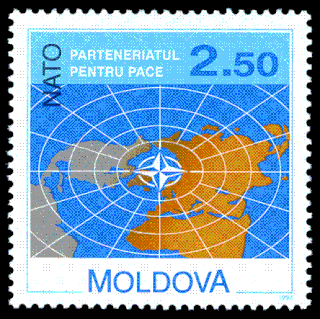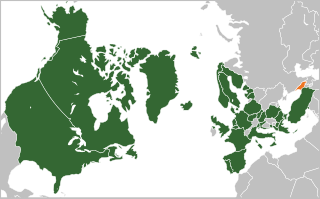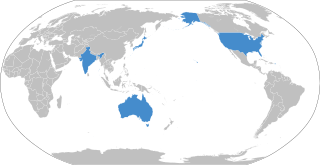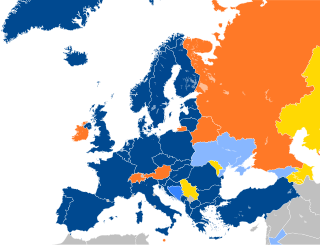
The Euro-Atlantic Partnership Council (EAPC) is a post–Cold War, North Atlantic Treaty Organization (NATO) institution. The EAPC is a multilateral forum created to improve relations between NATO and non-NATO countries in Europe and Central Asia. States meet to cooperate and discuss political and security issues. It was formed on 29 May 1997 at a Ministers’ meeting held in Sintra, Portugal, as the successor to the North Atlantic Cooperation Council (NACC), which was created in 1991.

The Shanghai Cooperation Organisation (SCO) is a Eurasian political, economic, international security and defence organization established by China and Russia in 2001. It is the world's largest regional organization in terms of geographic scope and population, covering approximately 80% of the area of Eurasia and 40% of the world population. As of 2021, its combined GDP was around 20% of global GDP.

The Partnership for Peace is a North Atlantic Treaty Organization (NATO) program aimed at creating trust and cooperation between the member states of NATO and other states mostly in Europe, including post-Soviet states; 19 states are members. The program contains 6 areas of cooperation, which aims to build relationships with partners through military-to-military cooperation on training, exercises, disaster planning and response, science and environmental issues, professionalization, policy planning, and relations with civilian government. During policy negotiations in the 1990s, a primary controversy regarding PfP was its ability to be interpreted as a program that is a stepping stone for joining NATO with full Article 5 guarantees.

The Atlantic Treaty Association (ATA) is an umbrella organization which draws together political leaders, academics, military officials, and diplomats to support the North Atlantic Treaty Organization (NATO). The ATA is an independent organization that is separate from NATO.

The NATO Parliamentary Assembly serves as the consultative interparliamentary organisation for the North Atlantic Treaty Organization. Its current President is Michał Szczerba from Poland, elected in 2023. Its current Secretary General is Ruxandra Popa, who has been in this position since January 2020.

The German Marshall Fund of the United States (GMF) is a non-partisan American public policy think tank that seeks to promote cooperation and understanding between North America and the European Union.
The Mediterranean Dialogue, first launched in 1994, is a forum of cooperation between NATO and seven countries of the Mediterranean. Its stated aim is "to create good relations and better mutual understanding and confidence throughout the region, promoting regional security and stability and explaining NATO's policies and goals."

The inaugural session of the Black Sea Forum for Partnership and Dialogue (BSF) was held on June 4–6, 2006 in Bucharest. The Forum is a Romanian initiative, initially meant to hold annual presidential-level summits and thematic or sectoral-cooperation meeting during those annual intervals. The Forum is not meant to create new regional institutions, but rather to turn into a regular consultative process among countries of the extended Black Sea region and between this group of countries and international organizations such as the European Union. After the inaugural summit, no other summits were planned.

The United States and the Republic of Kazakhstan established diplomatic relations on December 16, 1991. The United States opened its embassy in Almaty in January 1992 and then relocated to Astana in 2006.

The 2006 Riga summit or the 19th NATO Summit was a NATO summit held in the Olympic Sports Centre, Riga, Latvia from 28 to 29 November 2006. The most important topics discussed were the War in Afghanistan and the future role and borders of the alliance. Further, the summit focused on the alliance's continued transformation, taking stock of what has been accomplished since the 2002 Prague Summit. NATO also committed itself to extending further membership invitations in the upcoming 2008 Bucharest Summit. This summit was the first NATO summit held on the territory of the Baltic states.

The 2004 Istanbul summit was held in Istanbul, Turkey from 28 to 29 June 2004. It was the 17th NATO summit in which NATO's Heads of State and Governments met to make formal decisions about security topics. In general, the summit is seen as a continuation of the transformation process that began in the 2002 Prague summit, which hoped to create a shift from a Cold War alliance against Soviet aggression to a 21st-century coalition against new and out-of-area security threats. The summit consisted of four meetings.

Georgia and the North Atlantic Treaty Organization (NATO) enjoy cordial relations. Georgia is not currently a member of NATO, but has been promised by NATO to be admitted in the future.
The Geneva Centre for Security Policy (GCSP) is an international foundation that was established in 1995 under Swiss law to "promote the building and maintenance of peace, security and stability". The GCSP was founded by the Federal Department of Defence, Civil Protection and Sports in cooperation with the Federal Department of Foreign Affairs as a Swiss contribution to Partnership for Peace (PfP).

The Union for the Mediterranean is an intergovernmental organization of 43 member states from Europe and the Mediterranean Basin: the 27 EU member states and 16 Mediterranean partner countries from North Africa, Western Asia and Southern Europe. It was founded on 13 July 2008 at the Paris Summit for the Mediterranean, with an aim of reinforcing the Euro-Mediterranean Partnership (Euromed) that was set up in 1995 as the Barcelona Process. Its general secretariat is located in Barcelona, Catalonia, Spain.

The Quadrilateral Security Dialogue (QSD), commonly known as the Quad, is a strategic security dialogue between Australia, India, Japan and the United States that is maintained by talks between member countries. The dialogue was initiated in 2007 by Japanese Prime Minister Shinzo Abe, with the support of Australian Prime Minister John Howard, Indian Prime Minister Manmohan Singh and U.S. Vice President Dick Cheney. The dialogue was paralleled by joint military exercises of an unprecedented scale, titled Exercise Malabar. The diplomatic and military arrangement was widely viewed as a response to increased Chinese economic and military power.

NATO maintains foreign relations with many non-member countries across the globe. NATO runs a number of programs which provide a framework for the partnerships between itself and these non-member nations, typically based on that country's location. These include the Euro-Atlantic Partnership Council and the Partnership for Peace.
The Partnership for Peace Consortium is a network of over 800 defense academies and security studies institutes across 60 countries. Founded in 1998 during the NATO Summit, the PfPC was chartered to promote defense institution building and foster regional stability through multinational education and research, which the PfPC accomplishes via a network of educators and researchers. It is based at the George C. Marshall European Center for Security Studies in Garmisch, Germany. According to the PfPC Annual Report of 2012, in 2012 eight hundred defense academies and security studies institutes in 59 countries worked with the PfPC in 69 defense education/defense institution building and policy-relevant events. The Consortium publishes an academic quarterly journal CONNECTIONS in English and Russian. The journal is run by an international Editorial Board of experts and is distributed to over 1,000 institutions in 54 countries.

NATO Defense College (NDC) is the international military college for North Atlantic Treaty Organization countries. It is located in Rome, Italy.
Pierre Razoux is a writer and historian, a French Senior Civil Servant and a Doctor of Military History. He is in charge of the Mediterranean Dialogue and the Istanbul Cooperation Initiative. He studied law, history and international politics. He served previously in the Delegation for Strategic Affairs of the French Ministry of Defence and he got some years appointment in the Policy Division of the British Ministry of Defence as an exchange officer. He has a long experience in the field of international affairs and defence, particularly on Northern African, Middle Eastern, Caucasian, NATO and European matters.

The C5+1 is a diplomatic summit that has been held every year since 2015 between the foreign ministers of the five Central Asian countries of Kazakhstan, Kyrgyzstan, Tajikistan, Turkmenistan, and Uzbekistan, with the United States Secretary of State to discuss and work on common issues of concern to improve and strengthen the U.S. relationship with the five Central Asian states, but to also enhance the relations between the individual nations in Central Asia. The format is used to discuss regional issues such as the war in Afghanistan, the Syrian civil war, the War on terror, combatting drug and human trafficking, economic issues regarding trade relations, job growth in the region, and combatting environmental issues.

















